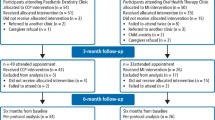Abstract
Aim To investigate the differential preventive effect of motivational interviewing on early childhood caries according to socioeconomic variables in a primary healthcare setting.
Trial design Randomised, double-blind trial with two parallel groups, based in a community setting.
Study population Selected from an invited subgroup of children born in 2013 and 2014 in the northern area of the city of Porto Alegre, Rio Grande do Sul, Brazil
Interventions Primary caregivers of the patients were randomised to receive information about breastfeeding, child nutrition and oral hygiene during an initial dental appointment in the patient's first year of life either by conventional delivery techniques or by motivational interviewing.
Outcomes Analysis of dmfs index from clinical examination
Results Nine-hundred and fifteen patients were randomised to the two arms and 414 children were included in the study, with 501 lost to follow up. One-hundred and eighty-six received conventional health education, and 228 received motivational interviewing. The caries rate per 100 surface year was 1.29 for the conventional education group, and 0.46 for the motivational interviewing group. The effect of motivational interviewing was statistically significant in the lower-income category with prevention of 57% of carious lesions. There was no such statistically significant difference in the higher income subjects.
Conclusions The outcome showed reduced caries experience by children where their primary caregiver has received preventative advice via a motivational interviewing technique when compared to conventional education methods. This study suggests that motivational interviewing is more effective in more disadvantaged groups.
This is a preview of subscription content, access via your institution
Access options
Subscribe to this journal
Receive 4 print issues and online access
$259.00 per year
only $64.75 per issue
Buy this article
- Purchase on Springer Link
- Instant access to full article PDF
Prices may be subject to local taxes which are calculated during checkout
Similar content being viewed by others
References
Miller W, Rollnick S. Motivational Interviewing: Helping People Change. New York: Guilford Press, 2013.
National Dental Inspection Programme (NDIP) 2018: Report of the 2018 Detailed Inspection Programme of Primary 1 Children and the Basic Inspection of Primary 1 and Primary 7 children. Information Services Division, NHS National Services Scotland.
NHS Digital. Child Dental Health Survey 2013, England, Wales and Northern Ireland. Health and Social Care Information Centre. Available at: https://digital.nhs.uk/data-and-information/publications/statistical/children-s-dental-health-survey/child-dental-health-survey-2013-england-wales-and-northern-ireland (accessed August 2020).
Gao X, Lo E, Kot S, Chan K. Motivational interviewing in improving oral health: a systematic review of randomised controlled trials. J Periodontol, 2013; 85: 426-437.
Cascaes A M, Bielemann R M, Clark V L, Barros A. Effectiveness of motivational interviewing at improving oral health: a systematic review. Rev Saude Publica 2014; 48: 142-153.
Author information
Authors and Affiliations
Rights and permissions
About this article
Cite this article
McCann, C. Does motivational interviewing contribute to caries prevention in children from lower income families? . Evid Based Dent 21, 110–111 (2020). https://doi.org/10.1038/s41432-020-0127-1
Published:
Issue Date:
DOI: https://doi.org/10.1038/s41432-020-0127-1



